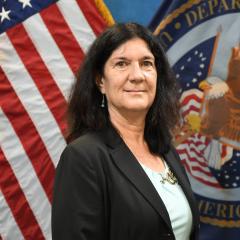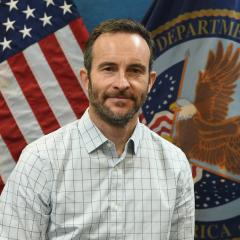Geropsychology
The goal of this track of training is to provide residents with comprehensive clinical training and skillset for providing the best care practices to older Veterans, their families and related care systems.





Licensed Psychologist | Home Based Primary Care Team
VA Bedford health care
Phone:
Email: rachel.movitz@va.gov

Geropsychology
Dr. Lisa Bloom-Charette | Lisa.Bloom-Charette@va.gov
Dr. Kristen Dillon | kristen.dillon@va.gov
Dr. Lisa Taylor | lisa.taylor2@va.gov
Dr. Matt Wachen | Robert.Wachen2@va.gov
The Geropsychology Fellowship at VA Bedford utilizes the Pikes Peak Model for training in Professional Geropsychology and emphasizes training that prepares future clinicians to become Board Certified Geropsychologists. The overall goals of the residency are to: 1) provide evidenced-based treatments and interventions for older veterans and their families; 2) recognize the intersection of cognitive, emotional, medical, and functional changes that accompany aging; 3) understand the diverse experience of older adults navigating healthcare and the involvement of various stakeholders; 4) hone skills necessary to function on an interdisciplinary team in various settings. We invite you to watch the following video about our program: VA Bedford Geropsychology Training.
The resident will work concurrently in three to four clinical settings depending on interest and training goals. Training settings in the program included in this training experience:
- Dementia Specialty Care Unit
- Inpatient Hospice and Palliative Care Consult Team
- Community Living Center
- Home-Based Primary Care (HBPC)
- Geriatric Evaluation and Management Unit (GEM)
- Outpatient Geropsychology Clinic
Each of these settings prepares trainees for board certification and the opportunity to hone their clinical skills in the seven major core competencies identified in the Pike’s Peak Model for Geropsychology Training (Theoretical/Conceptualization Skills, Psychological Assessment, Psychological Intervention, Consultation, Program Development and Evaluation, Clinical Supervision, and Teaching).
Residents are trained in the use of evidenced-based treatments with particular focus on how to adapt treatments for older adults. In all settings, residents will have an opportunity to work on various interdisciplinary teams that share decision-making, treatment planning, and implementation responsibilities. Opportunities for research, program development, administration, and teaching are available. The resident will provide supervision to interns and practicum students and will receive training in supervision., Residents will also participate in a variety of teaching, educational and professional development activities aimed to prepare clinicians to function as a staff psychologist by the end of their postdoctoral training.
Clinical rotations:
Community Living Center (CLC/Geriatric Evaluation and Management (GEM): Community Living Center psychology services are offered on nine inpatient units: four general CLC units, three dementia specialty care CLC units, one geriatric evaluation and management GEM/ shorter-term rehabilitation unit, and the hospice unit. The resident will be assigned specifically to one to two of those units and may also work with Veterans on other units in instances of transfers, continuity of care, or special circumstances. The psychological services include, but are not limited to, evaluation, psychotherapy, and consultation. Evaluations consist of personality, basic cognitive assessment, safety/suicide evaluations and planning. Consultation with Neuropsychology services is available for in-depth evaluations. Therapy referral questions include general mental health concerns with an understanding of health and geriatric needs and often include anxiety, PTSD, depression, pain, sleep, adjustment, grief, couples/family, emotional regulation, health management, etc. Individual therapy treatment options available to Veterans include, but are not limited to: multiple subsets of cognitive behavioral treatment, acceptance and commitment therapy, cognitive processing therapy, later-adulthood trauma reengagement, meaning centered psychotherapy, complicated grief treatment, validation, hospice approach, seeking safety, motivational interviewing, life review, and more. The resident will also have the opportunity to facilitate a group in the CLC, and ongoing groups include for caregivers, positive psychology, and reminiscence. Residents will also be trained in use of the STAR-VA model of consulting with Veterans and staff in dealing with dementia-related behaviors.
Dementia Specialty Care Units (DSCU): DSCUs offer a valuable training opportunity for students interested in working with veterans with dementia and providing caregivers support to veteran’s families. On our three specialty care units, interdisciplinary teams provide individualized, compassionate care to promote quality of life for veterans coping with neurocognitive disorders. As a student, you will participate in assessments, care planning, and evidence-based interventions including STAR VA for veterans' behavioral and psychological symptoms. You will consult with the team to develop holistic, patient-centered care plans informed by the veterans' abilities, needs and interests. You will have the chance to learn and educate others on behavioral modification techniques to address challenging behaviors. An important part of your role will be providing support and education to families and caregivers of veterans with dementia. During your placement, you will gain experience in geriatric mental health care including differential diagnosis, therapy approaches and program development. You will also attend and conduct staff trainings on best practices in dementia care, managing behaviors, and delivering compassionate end-of-life care. Our specialty units provide an impactful opportunity to build skills in working with veterans with dementia and making a difference for them and their families.
Home-Based Primary Care (HBPC): In Home-Based Primary Care, an interdisciplinary primary care service for homebound Veterans, psychology trainees truly “meet Veterans where they are.” On this rotation, you will join HBPC psychology staff in traveling to Veterans’ homes to provide clinical assessment and psychotherapy. You will learn to utilize cognitive screening techniques to assess for presence of dementia or other cognitive deficits and establish a baseline track of decline. You will also use psychological assessment techniques to screen for mental health issues such as depression, anxiety disorders, and PTSD. HBPC trainees also learn to collaborate with fellow team members in truly interdisciplinary care, exchanging pertinent information, learning sensitivity to maintaining Veterans’ dignity and privacy while collaborating inter-disciplinarily, and developing expertise in health psychology through teamwork. You will have opportunities to conduct individual and couples’ psychotherapy in Veterans’ homes for Veterans coping with psychological, psychosocial, medical problems and issues of aging, such as loss of independence and end of life, and you will refine skills in Veteran and family education and treatment planning. Caregiver education and family support is also a component of this service. Close staff supervision will support your training in complex ethical situations, as well as assist you in delivering psychological services in unconventional settings.
Hospice and Palliative Care: The hospice and palliative care rotation provides trainees comprehensive training in end-of-life psychological care. Trainees develop competency in assessing and addressing psychological, sociocultural, spiritual, and interpersonal factors impacting patients with advanced terminal illness and their loved ones. Core training components include: understanding the dying process; managing complicated grief and bereavement; addressing specific assessment and psychotherapy needs of Veterans with chronic life-limiting illness focused on symptom management and end-of-life issues; providing anticipatory grief services for family members; delivering bereavement care for families/loved ones of deceased Veterans; and supporting professional caregivers experiencing compassion fatigue. Trainees will also gain experience with ethical and legal considerations in hospice and palliative care provision in varied contexts. Our interdisciplinary team was a recipient of the National Compassionate Caregiver Award in 2022, offering trainees an opportunity to train and become a member of an award winning team. Overall, the rotation prepares future geropsychologists to provide compassionate, evidence-based end-of-life care.
Geropsychology Outpatient Clinic: Psychology trainees in our Geropsychology Outpatient Clinic conduct individual and group psychotherapy in a more traditional mental health care setting, engage in program development, and provide clinical consultation to other mental health programs throughout the hospital where older Veterans receive care. You will hone your skills in sharing your expertise in Geropsychology in settings such as our general Mental Health Clinic (MHC) and with our Primary Care Behavioral Health providers. You will attend team meetings in the MHC to provide consultation with diagnostic and treatment planning recommendations for team members working with older adults. Trainees in our Geropsychology residency will also train in the administration of a clinic, responding to consults, managing the caseloads of fellow clinicians, and developing clinic policy. The rotation in the Geropsychology Outpatient Clinic is one more setting in which our Team Gero staff and trainees meet the increasing demand for Geropsychology services here at VA Bedford!
Didactic Activities: Clinical experiences are supported by didactic seminars that include monthly Geropsychology didactics, Geriatric Grand Rounds, Capacity evaluation didactics, bimonthly Psychology Grand Rounds, Psychology Training Day as well as numerous inter-professional trainings within the Hospital. Residents will also attend trainings designated to the larger postdoctoral cohort such as Diversity, Ethics, and Supervision of Supervision.
Supervision: The resident will receive a minimum of two hours of individual supervision and one hour of group supervision per week. The resident will also be expected to provide one hour of supervision to at least one practicum student.
Learning objectives
1. To understand the biological, psychological, and social aspects of normal aging
2. To understand common medical and/or neurological problems, their interplay, and how those issues affect psychological treatments
3. To facilitate a psychotherapy group with older adults
4. To effectively implement general as well as age-specific evidenced based treatments
5. To verbalize understanding of end-of-life issues and utilize associated interventions
6. To identify the complex ethical issues that arise in the care of the older adult
7. To recognize the importance of inter-professional teams to address the complex treatment needs of the older individual
8. To understand the continuity of care for the older Veteran
9. To be skilled in the psychological assessment of the older adult
10. To learn to assess various risk factors and provide appropriate interventions
11. To be able to provide consultation to team members to incorporate Geropsychology information into treatment planning and implementation
Target professional experiences
1. Carry a total caseload of approximately 12-15 psychotherapy clients, providing a minimum of ten hours per week of individual treatment across three to four of the Geropsychology rotations (CLC, outpatient, HBPC, and Hospice/Palliative Care)
2. Co-facilitate a minimum of two psychotherapy groups related to one’s particular area of clinical interest and needs of the veterans.
3. Collaborate with inter-professional trainees and faculty on at least one inter-professional team.
4. Provide consultation and outreach to staff and families in the CLC and/or Palliative Care unit.
5. Provide supervision to earlier-in-training psychology students
6. Determine specific clinic/program needs and modifications and to institute at least one innovative geriatric based program.
